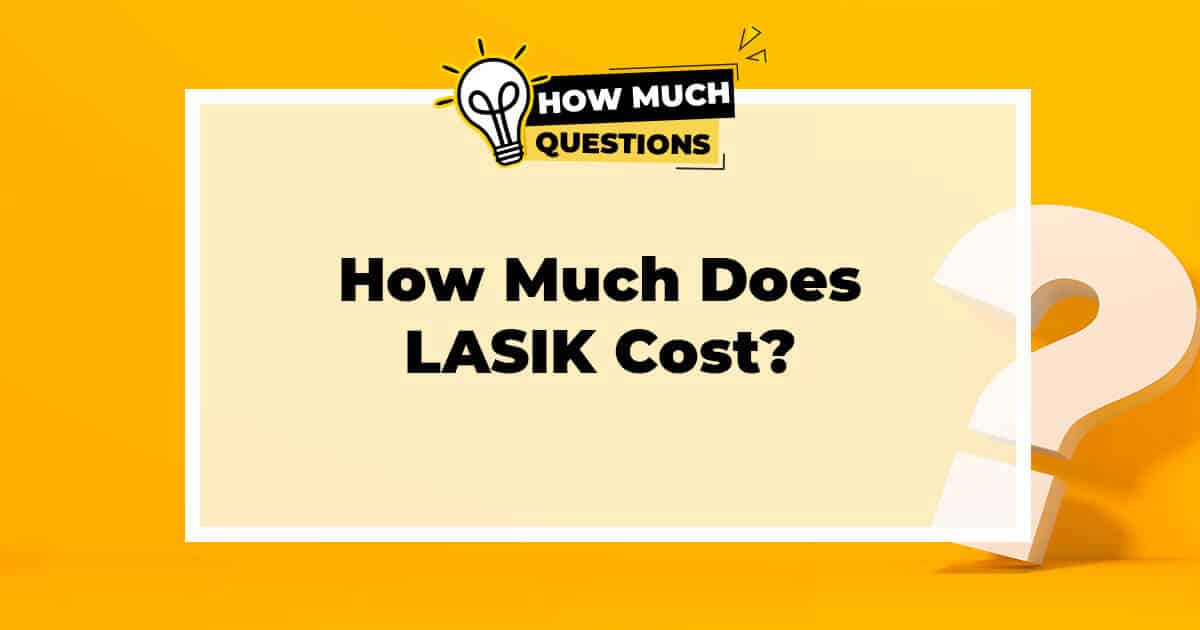
How Much Does LASIK Cost? Unraveling the Price Factors and Tips
Exploring the intricate factors influencing LASIK eye surgery costs. Dive deep to understand the breakdown, pre-purchase considerations, and ways to optimize your spend.

Introduction
LASIK, or Laser-Assisted In Situ Keratomileusis, has become one of the most popular elective surgical procedures worldwide. With its impressive track record of improving vision, many consider this investment in their eyesight. But how much does LASIK cost? As with many medical procedures, a multitude of factors determines the price tag. Let’s delve into the details.
How Much Does LASIK Cost?
LASIK eye surgery is a popular procedure for vision correction. The cost of LASIK can vary based on factors such as location, surgeon's experience, and technology used. On average:
- United States: $2,000 to $3,000 per eye
- Canada: CAD 1,500 to CAD 3,000 per eye
- United Kingdom: £1,000 to £2,500 per eye
It's essential to note that these are average figures, and actual costs may differ. Some clinics offer financing options or discounts, so it's advisable to shop around and consult with multiple providers. Additionally, insurance may not always cover LASIK, so it's crucial to check with your provider.
Factors Influencing Cost
Technology Utilized
Advancements in technology mean more precision but can also equate to higher costs. Traditional LASIK might be more affordable than its more advanced counterparts like Wavefront or Topography-guided LASIK.
Surgeon’s Experience
As with most professions, experience often correlates with price. Surgeons with extensive LASIK experience might charge more due to their expertise and consistent results.
Geographical Location
In metropolitan areas or cities with a high cost of living, LASIK might come with a heftier price. Conversely, rural areas might offer more competitive rates.
Included Aftercare
Post-operative care, including follow-up visits and medications, can sometimes be included in the LASIK cost. It's essential to factor these in when comparing prices.
Pre-Purchase Considerations
Reputation of the Clinic
While cost is a significant factor, so is safety. Prioritize clinics with good reviews, proper certifications, and a track record of success.
Included Warranties
Some providers offer a warranty that covers enhancements or touch-ups if needed. Understand the specifics of these offers.
Be wary of prices that seem too good to be true. Ensure all potential additional fees are transparent before committing.
Be wary of prices that seem too good to be true. Ensure all potential additional fees are transparent before committing.
Cost-Saving Tips
- Seasonal Promotions: Some clinics might offer discounts during particular seasons.
- Insurance: Some insurance plans might partially cover the cost if LASIK is deemed medically necessary.
- Financing Options: Many clinics offer financing plans, allowing patients to pay in installments.
Guidance for Optimal Choices
- Prioritize Quality Over Cost: While it's tempting to opt for cheaper alternatives, remember this is an investment in your vision.
- Ask Questions: Ensure you fully understand the procedure, its risks, and potential outcomes.
- Seek Multiple Consultations: By doing so, you can compare both prices and services to find the best fit.
Conclusion
LASIK eye surgery is undeniably a significant investment in your well-being. By understanding the factors that influence its cost, considering essential pre-purchase aspects, and equipping yourself with cost-saving insights, you're well on your way to making an informed decision. Do you have personal experiences or further questions about LASIK costs? Share them in the comments below.
This article is intended for informational purposes only. Always consult with a medical professional before making any decisions about LASIK or any other medical procedure.
Frequently Asked Questions (FAQ)
How long does the LASIK procedure take?
The LASIK procedure itself is relatively quick, typically taking about 10 to 15 minutes for both eyes. However, patients should expect to be at the clinic for a couple of hours due to preparations, post-surgery evaluations, and recovery.
What's the success rate of LASIK surgery?
LASIK surgery has a high success rate, with 90-95% of patients achieving 20/40 vision or better. However, individual results can vary, and it's essential to have realistic expectations.
Are there any risks associated with LASIK?
While LASIK is generally safe, as with any surgery, there are potential risks. These can include dry eyes, glare, halos, undercorrections, overcorrections, and even vision loss in rare cases. It's crucial to discuss potential risks with your surgeon before the procedure.
How long is the recovery period after LASIK?
Most patients notice an immediate improvement in their vision, but it can take a few days to a couple of weeks for vision to stabilize. Patients are usually able to return to work and most daily activities the day after the procedure.
Does health insurance cover LASIK?
Typically, LASIK is considered a cosmetic procedure, so most health insurance plans do not cover it. However, it's worth checking with your insurance provider as some may offer discounts or have partnerships with LASIK clinics.
What are the alternatives to LASIK?
If you're not a candidate for LASIK, there are other vision correction surgeries like PRK (photorefractive keratectomy), LASEK, and implantable lenses. Consult with an ophthalmologist to determine the best option for your needs.
How do I know if I'm a candidate for LASIK?
A comprehensive eye examination by a LASIK surgeon will determine if you're a good candidate. Factors considered include the thickness of your cornea, the stability of your prescription, and your overall eye health.
How long do the results of LASIK last?
For most patients, the results of LASIK are permanent. However, the natural aging process can lead to vision changes, and some patients may require reading glasses as they age.
Is LASIK painful?
Most patients report feeling only slight discomfort during LASIK, often describing it as a feeling of pressure. Anesthetic eye drops are used to numb the eyes, making the procedure virtually painless.
Can LASIK be repeated if my vision changes again?
In some cases, a second procedure, often referred to as an "enhancement," can be performed if vision changes significantly after the initial LASIK. However, it's best to consult with your surgeon to determine the best course of action.
If you want to know other articles similar to How Much Does LASIK Cost? Unraveling the Price Factors and Tips you can visit the category Healthcare and Wellness.
- Introduction
- How Much Does LASIK Cost?
- Factors Influencing Cost
- Pre-Purchase Considerations
- Cost-Saving Tips
- Guidance for Optimal Choices
- Conclusion
- Frequently Asked Questions (FAQ)
- How long does the LASIK procedure take?
- What's the success rate of LASIK surgery?
- Are there any risks associated with LASIK?
- How long is the recovery period after LASIK?
- Does health insurance cover LASIK?
- What are the alternatives to LASIK?
- How do I know if I'm a candidate for LASIK?
- How long do the results of LASIK last?
- Is LASIK painful?
- Can LASIK be repeated if my vision changes again?
Leave a Reply







You might be interested in